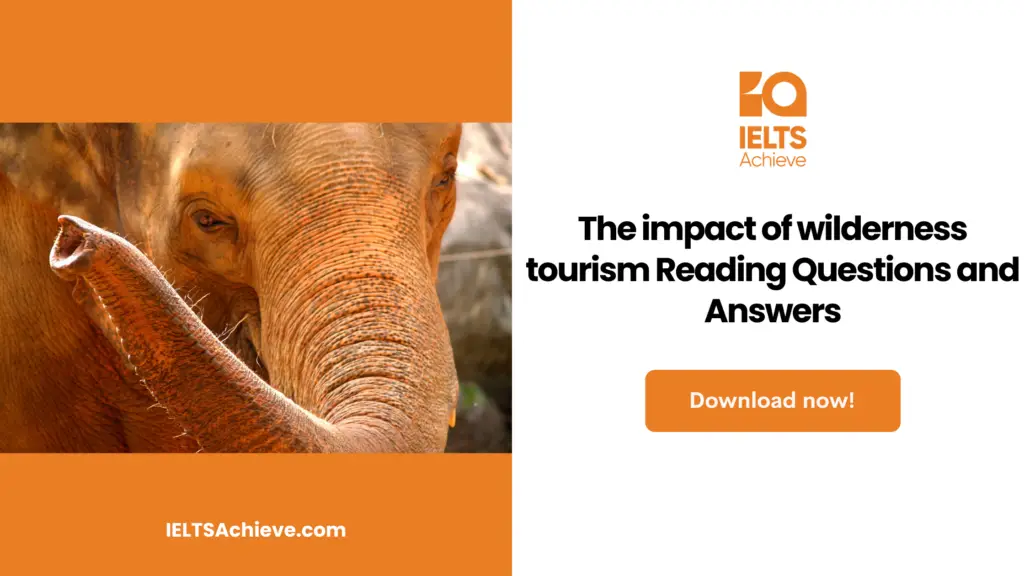The Blog post contains the following IELTS Reading Questions:
- IELTS Reading Yes/No/Not given
- IELTS Reading Table completion
- IELTS Reading Matching Headings
Stay informed and prepared for success – Explore our comprehensive Reading Test Info page to get valuable insights, exam format details, and expert tips for mastering the IELTS Reading section.
IELTS Reading Passage: The impact of wilderness tourism

The impact of wilderness tourism
Tourism industry In rural locations is booming like never before. Mountains, Arctic territories, deserts, small islands, and wetlands are just a few of the ‘wilderness’ places that countries all over the world are pushing to high-spending tourists. The attraction of these regions is obvious.- by definition, wilderness tourism demands little or no upfront expenditure. But that does not mean that there is no expense. As the 1992 United Nations Conference on Environment and Development recognised, these places are fragile (i.e. very subject to abnormal stresses) not simply in terms of their ecosystem, but also in terms of the culture of its inhabitants. The three most major categories of fragile environment in these regards, and also in terms of the proportion of the Earth’s surface they cover, are deserts, mountains and Arctic areas. An essential aspect is their significant seasonality, with harsh circumstances prevailing for many months each year. As a result, most forms of human activity, such as tourism, are restricted to specific times of year.
Tourists are drawn to these locations by their natural scenic beauty and the unique traditions of its indigenous people. And poor governments in these distant locations have welcomed the new kind of ‘adventure tourist’, appreciative for the hard dollar they bring. Nepal and Bhutan have relied heavily on tourism as a source of foreign currency for several years. Arctic regions like Lapland and Alaska, as well as desert regions like Ayers Rock in Australia and Monument Valley in Arizona, rely heavily on tourists to support their economies.
The local population will be drastically altered once a certain area becomes a popular tourist destination. It’s hardly surprising that many hill-farmers leave their farm work to other members of the family when, for example, they can make more money in a few weeks working as porters for foreign trekkers than they can in a year working on their fields. Due to a lack of labour to keep up terraces and irrigation systems and tend to crops, agricultural productivity has dropped drastically in several hill-regions, altering the local cuisine. As a result, many residents of these areas have begun relying on food aid from elsewhere, particularly on rice imports.
Traditional year-round subsistence in Arctic and desert communities has relied on a relatively limited season of hunting animals and fish and collecting fruit. Yet other locals’ increased involvement in tourism has left them with less time to forage, leading to a growing reliance on commercially produced foods and supermarkets. Sometimes locals or residents are responsible for these shifts, and not tourists. Any form of paid labour or government handouts has the potential to destabilise established social structures and ways of life. No whatever the root cause, the question remains the same: what would happen if these supplementary revenue streams disappear?
Another major issue with expansion is the strain that tourists put on infrastructure. When engaging in extreme tourism. The necessity to serve tourists with cooked food and hot showers has resulted in a lot of deforestation and has had an influence on water resources, but erosion along key paths has gotten a lot more press. Both mountainous regions and arid regions rely heavily on fuel wood from slow-growing trees since water sources may be scarce or depleted due to high demand.
Numerous news reports and personal accounts have surfaced in recent years detailing the many negative aspects of the tourism industry. However, that is not necessarily an issue. There will always be some negative impact from tourists, but it is possible to lessen the blow to already vulnerable ecosystems and local traditions. As with the Sherpas of Nepal’s Khumbu Valley and other Alpine settlements, tourism can even serve as a means of revitalising indigenous traditions. And an increasing number of adventure tourism businesses are working to guarantee that their operations have a positive long-term impact on the local community and environment.
Locals in the Swiss Alps have recognised the need of incorporating tourism into the regional economy. As a result of locals’ worries about the proliferation of second-home communities in the Swiss Pays d’Enhaut, the expansion of such projects has been restricted. The making of cheese in communities has also seen a resurgence. In the region, giving inhabitants a steady income that doesn’t hinge on tourists.
Outside corporations have abused many Arctic tourist hotspots, hiring seasonal workers and sending most of the money back to their home countries. However, some Arctic towns are taking matters into their own hands by running tour enterprises. A good illustration of this would be an Alaskan native-owned and -operated business. Is operating a flight from Anchorage to Kotzebue, where visitors may sample Arctic fare, see the tundra, and take in a performance of traditional music and dance.
Peoples of the Continent of the Americas Similar techniques have been implemented in the American Southwest’s desert regions, where artisans and craftspeople work hard to attract tourists to their pueblos and reservations so that they can sell them their wares. The pottery industries of the Acoma and San ildefonso pueblos are quite successful with jewellery, while those of the Navajo and Hopi are equally so.
Too many vulnerable communities have seen tourism threaten their economies, cultures, and landscapes, leading to a loss of authority over all three. The problem of imbalance cannot be solved by merely limiting tourism, as people will always have a desire to explore the world. Instead, communities in vulnerable ecosystems need to gain more sway over tourist projects in their areas so that they can meet their own goals without sacrificing those of visitors. With strong communal decision-making, more and more communities are showing that this is achievable. This raises the crucial question of whether or not this can become the norm rather than the exception.
Unlock your full potential in the IELTS Reading section – Visit our IELTS Reading Practice Question Answer page now!
Recommended Questions:
Renewable Energy IELTS Reading Question with Answer
The impact of wilderness tourism Reading Questions
Do the following statements reflect the opinion of the writer of Reading Passage? In boxes 1-6 on your answer sheet, write
YES if the statement reflects the opinion of the writer
NO if the statement contradicts the opinion of the writer
NOT GIVEN if it is impossible to say what the writer thinks about this
1. Because of the cheap financial cost of offering wilderness tourism, it is appealing to many governments.
2. Deserts, mountains, and Arctic areas are examples of biologically and culturally sensitive habitats.
3. Wilderness tourism is available all year in sensitive locations.
4. The increase in tourists in certain highland regions has reduced the amount of food produced locally.
5. Food gathering in desert communities was spread equitably throughout the year.
6. Government subsidies harm traditional food-gathering practises more than tourism.
Want to excel in identifying the writer’s views and claims? Click here to explore our in-depth guide on how to accurately determine Yes, No, or Not Given in the IELTS Reading section.
Questions 7-10
Complete the table below.
Choose ONE WORD from Reading Passage for each answer.
Write your answers in boxes 7-10 on your answer sheet.
| The positive ways In which some local communities haveresponded to tourism | |
| People/Location | Activity |
| Swiss Pays d’Enhaut Arctic communities Acoma and San ildefonso Navajo and Hopi | Revived production of 7.___________ Operate 8.__________ businesses Produce and sell 9.____________ Produce and sell 10.____________ |
Boost your performance in Summary, Notes, Table, and Flowchart Completion tasks. Click here to explore our detailed guide and learn how to effectively complete summaries, notes, tables, and flowcharts in the IELTS Reading section.
Questions 11-13
Reading Passage has three sections, A-C.
Choose the correct heading for each section from the list of headings below. Write the correct number i-vi in boxes 11-13 on your answer sheet.
| List of Headings | |
| i | In recent years, there has been an increase in international tourism. |
| ii | How can local communities strike a balance between their own needs and the demands of wilderness tourism? |
| iii | Fragile regions and the motives for tourism expansion |
| iv | Traditional food-supply strategies in vulnerable regions |
| v | Some of the negative consequences of wilderness tourism |
| vi | The Economic Advantages of Mass Tourism |
11. Section A
12. Section B
13. Section C
Ready to conquer Matching Headings questions? Click here to learn essential tips and techniques for matching headings accurately to paragraphs or sections in the IELTS Reading section.
Unlock your full potential in the IELTS Reading section – Visit our IELTS Reading Practice Question Answer page now!
Recommended Questions:
Renewable Energy IELTS Reading Question with Answer
The impact of wilderness tourism reading answers
1. Yes
2. Yes
3. No
4. Yes
5. No
6. Not given
7. Cheese
8. Tour
9. Pottery
10. Jewellery
11. iii
12. V
13. ii

We hope you found this post useful in helping you to study for the IELTS Test. If you have any questions please let us know in the comments below or on the Facebook page.
The best way to keep up to date with posts like this is to like us on Facebook, then follow us on Instagram and Pinterest. If you need help preparing for the IELTS Test, join the IELTS Achieve Academy and see how we can assist you to achieve your desired band score. We offer an essay correction service, mock exams and online courses.

